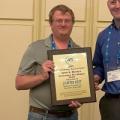Overview
Building on the fundamentals of the Clean Water Act, this seminar will address the rapidly changing world of stormwater compliance, including both the regulatory and technical issues involved in meeting the complex requirements. This seminar covers the many changes to the recently proposed 2026 EPA Multi-Sector General Permit (MSGP). Highlights include development of Stormwater Pollution Prevention Plans (SWPPPs), comparison of the currently effective 2021 and proposed 2026 EPA MSGPs with state specific permits, Best Management Practices (BMPs), tips/pitfalls, and the increasing regulatory scrutiny of PFAS and PFOA contamination.
Conference Agenda

Dan Plant
Metal Technologies, Inc., Auburn, IN
a) Introductions of course attendees
b) EPA Guidance Documents and Fact Sheets
c) State References
d) Vendor Lists
e) Class Materials Summary
Larry Bowers
Retired, Fernandina Beach, FL
a) Stream use designation
b) Water quality standards
c) User impairments
d) Anti-degradation
E) Effluent vs. water quality-based limits
f) Opportunity for third-party involvement

Curtis Veit
Waupaca Foundry, Waupaca, WI
a) Types of permits
- General (Industrial multi-sector and construction permits)
- Individual
b) EPA's Multi-Sector General Permit
- Applicability and effect on state agencies
- Potentially applicable sectors for the foundry industry
- Basic requirements
- 2021 vs 2024 proposed
*State covered will reflect student attendance. Register by April 1st to have your state included.
Mike Blankestyn
TRC, Lakewood, OH

Jim Alvarez
Keramida Inc., Indianapolis, IN
a) Non-numeric technology-based effluent limits
b) Benchmarks and data-comparison
c) Visual evaluations
d) Inspections
e) Reporting and recordkeeping
f) Non-stormwater discharges
g) Corrective actions and the iterative process
h) When is enough truly enough?
i) Common compliance pitfalls
j) Frequently asked questions

Curtis Veit
Waupaca Foundry, Waupaca, WI
a) Federal Stormwater Association Update
b) PFAS
c) EJ
Larry Bowers
Retired, Fernanda Beach, FL
a) Introduction to the AFS SWPPP resources and tools
b) Identification of outfalls
c) Identification and status of receiving waters
d) Identification of pollutants and pollutant sources
e) Identification of allowable non-stormwater discharges
f) Selection of BMPS
g) Inspection requirements
h) Monitoring requirements
i) Corrective action process
j) Training
k) Recordkeeping requirements
Mike Blankestyn
TRC, Lakewood, OH
Amanda Fedorko
Charlotte Pipe & Foundry Co., Oakboro, NC
a) Locations
b) Sampling procedures
c) Methods of analysis
Larry Bowers
Retired, Fernanda Beach, FL
a) Non-structural controls
- Operational
- Administrative
- Source Elimination
b) Fundamentals of stormwater pollutant removal
c) Cost-effective temporary controls
d) Stormwater structural controls
- Hydrodynamic separators
- Filter systems
- Low impact development (LID) methods
- Ponds
- Wetland treatment systems
e) Defining “Best Industry Practices”

Donovan Wilczynski, Keramida, Inc., Indianapolis, IN
a) Applicability
b) Definition of disturbance
c) Definition of a project (piecemeal)
d) NOI and SWPPP development
Utilize knowledge gained from this course and apply it to presented foundry scenarios. Identify things such as applicability of a general stormwater permit, compliance status, corrective action requirements, and determine BMPs, etc.
Registration
AFS Member:
$750.00 Early Registration (Ends 4/8/25)
$900.00 Standard Registration
Non-AFS Member:
$1,100.00 Early Registration (Ends 4/8/25)
$1,300.00 Standard Registration
AFS presents a variety of technical and management conferences (in both in-person and virtual formats). The refund policy for AFS conferences is as follows: 1) Substitutions are accepted at no charge at any time up until the start of the conference; 2) Full refunds are offered if AFS is notified in writing of cancellation at least 30 days in advance of the conference. No refunds or credits are available for less than 30 days written notice.
